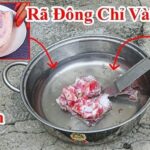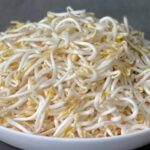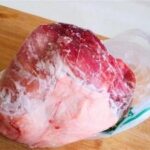Should you blanch meat in boiling water before cooking?
To ensure tasty meals and food safety, homemakers are very careful in selecting good and clean ingredients. Many people share a tip that, when buying pork, you should blanch it in boiling water before cooking to remove harmful substances. Boiling water at a high temperature will help kill viruses and bacteria… However, doing so does not remove toxins or dirt from the meat and may even be harmful to your health.
According to PGS.TS Nguyen Duy Thinh, former lecturer at Hanoi University of Technology, blanching meat in boiling water is an extremely wrong habit of many homemakers. Putting meat in boiling water will cause the meat to denature and contract. At high temperatures, the surface proteins of the meat clump together, trapping dirt or toxins inside.
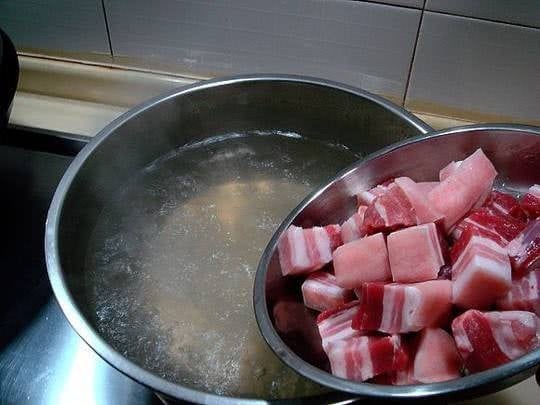
Blanching Meat in Hot Water
Therefore, you should only use boiling water if you want to sterilize the meat. If the meat is contaminated, you can process it by boiling it thoroughly, which will kill the bacteria and make the meat safer to consume.
Instead of blanching the meat in boiling water, if you want to remove dirt and chemicals from the pork, the best way is to rinse it thoroughly with clean water several times after purchasing. You can also use salt or diluted saline solution to rub the meat, then rinse it with clean water.
Additionally, you can soak the meat or bones in rice washing water for about an hour. This method is very effective in removing dirt and grease from the surface of the ribs, as well as reducing the fishy smell, making the dish more delicious.
You can also place the bones or meat in a bowl of water with a little white vinegar, soak for about 15 minutes, then remove and rinse with clean water before cooking. Vinegar helps tenderize the meat and remove excess blood.
To clean the meat, you can refer to the following methods:
1. Rinse the meat with clean water
This is the first and most basic step in cleaning meat. When you buy meat, make sure to rinse it thoroughly under cold running water to remove dirt and surface impurities. Rinsing multiple times helps reduce the risk of bacterial infection and is an important step in ensuring food hygiene during preparation.
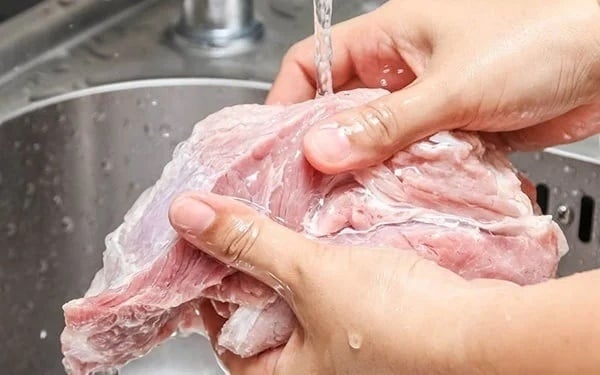
How to Clean Meat Properly
2. Use diluted saline solution
Diluted saline solution not only cleans the meat but also helps remove mucus and residual blood. You can add a small amount of salt to water and gently rub it onto the meat, then rinse the meat with clean water. Saline solution helps disinfect and gently clean the meat without removing its nutrients.
3. Soak the meat in rice washing water
Rice washing water can remove dirt and excess grease from the surface of the meat, as well as reduce its fishy smell. Simply soak the meat or bones in rice washing water for about an hour, then rinse thoroughly with cold water. This method ensures cleaner meat and a more fragrant aroma when cooked.
4. Soak the meat in white vinegar
White vinegar is a natural cleanser that can help tenderize muscle tissue and remove excess blood from the meat. To do this, dilute a small amount of white vinegar in a bowl of water and soak the meat for about 15 minutes before rinsing it with clean water. This method not only cleans the meat but also preserves its natural flavor.
5. Skim off the foam and scum when boiling meat
When boiling meat, it is important to skim off any foam and scum that forms, as it contains dirt and unnecessary proteins. Doing so will make the broth clearer and cleaner, while also improving the color and flavor of the meat. This simple step plays a significant role in ensuring the quality and safety of the meat after cooking.
When boiling meat, it is recommended to start with cold water and add onion and spices to enhance the flavor. During the cooking process, if foam or scum appears, skim it off to ensure a clear and clean broth.
Note:
To avoid the risk of buying dirty pork, consumers should purchase meat from reputable sources with clear quarantine stamps from authorities. Avoid buying from street vendors or unknown sources that do not guarantee food safety. To ensure the freshest pork, it is best to go to the market in the morning, as the afternoon usually has leftover meat from the morning.
Should you boil meat in hot or cold water?
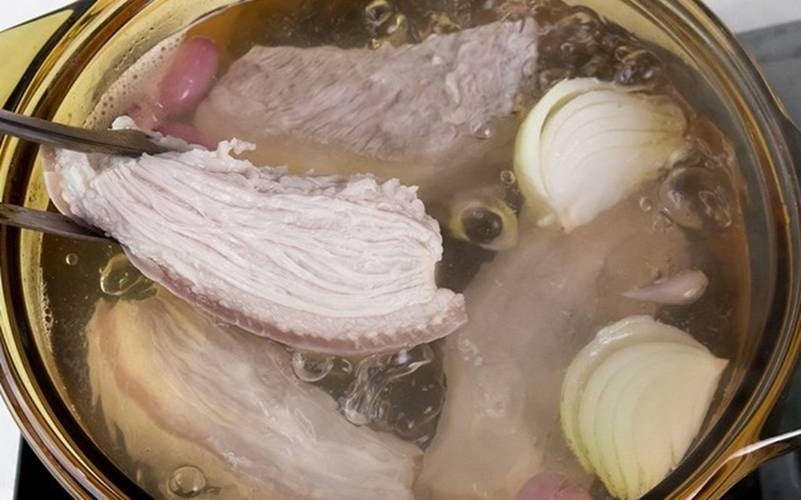
Delicious Boiled Pork
Some people have the habit of boiling meat in cold water, while others prefer to use hot water. Which method is better for taste and health?
Meat boiled in hot water will be sweeter than that boiled in cold water. This is because the meat retains its nutrients and does not break down from prolonged boiling. While meat boiled in cold water may not be as tasty, the broth will be sweeter and more flavorful due to the released nutrients. This broth can be used to cook soup.
Therefore, the choice depends on your preference and intended use. During the cooking process, if foam or scum appears, use a spoon to skim it off.
To enhance the aroma and avoid any unpleasant odors, you can add grilled onion, lemongrass, or other spices during preparation.
























